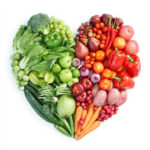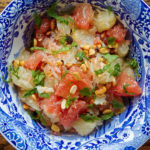
Thirty years of research reveals 10 of the best food phytonutrients to ingest to protect against and even treat the root cause of most cancers.
A new medical model is fast emerging in line with ancient wisdom: one that aims to strike to the root cause of disease and resolve it permanently, and which some call “functional medicine.” In cancer treatment, this highly rational approach involves targeting the cancer stem cells (CSCs) at the root of cancer malignancy. Because we now know that CSCs are resistant to chemotherapy and radiation treatment, and may even increase in number and invasveness when exposed to these outdated therapies, it is no longer ethical to continue with the conventional oncologist’s “standard of care.” Clearly, unless a cancer treatment is capable of selectively killing and/or inducing suicide programs (apoptosis) within cancer cells without harming non-cancerous cells, it is not going to produce a cure.
In light of this, we are excited to report on a new review published in the International Journal of Molecular Sciences titled, “Phytochemicals as Innovative Therapeutic Tools against Cancer Stem Cells,” which evaluated the evidence for what natural compounds within various foods and spices make for the most compelling treatments for targeting CSCs.
According to the review of 30 years worth of literature on the topic, the following 10 natural substances have been demonstrated to be the most effective chemopreventive dietary agents against CSCs:
Epigallocatechin-3-gallate (EGCG): A green tea extract
Curcumin: The primary polyphenol in turmeric root
Resveratrol: A phytochemical found in grapes, peanuts, Japanese knotweed
Lycopene: A red carotenoid found in watermelon, pink grapefruit, and tomatoes
Pomegranate extracts
Luteolin: A flavonoid found in peppers and various green vegetables
Genistein: A phytochemical found in soy, red clover, and coffee
Piperine: A phytochemicals found in black pepper
β-carotene: An orange carotenoid found in various vegetables
Sulforaphane: A sulfurous phytochemical found in Cruciferous vegetables
The researchers described the discovery that phytochemicals can selectively target CSCs as “a milestone in the improvement of cancer treatment because the synthetic anticancer drugs that are currently used are often highly toxic for healthy organs and weakens the patient’s immune system.”
They also pointed out that the phytochemicals or extracts identified above, due to their “low levels of toxicity for normal cells,” can be used in combination with other phytochemicals, “yielding powerful synergistic effects.”
They identified several key areas of focus for the future:
Finding a way to combine these compounds into “very active cocktails of phytochemicals” to address the multiple areas of treatment resistance often found in CSCs.
Compare the effects of natural phytochemicals with synthetic drugs, the latter of which they anticipate will be found to be less efficient.
Further research should be performed on CSCs to better understand the signaling pathways that govern their self-renewal and survival.
The authors concluded, “[T]he use of phytochemicals may be a true therapeutic strategy for eradicating cancer through the elimination of CSCs.”
A couple of follow-up resources rom Ocean Robbins, Food Revolution Network CEO
1) The Truth About Cancer has produced a 9-part 60-Minutes-style docu-series in which Ty Bollinger interviews more than 100 doctors, scientists, leaders and survivors in a global quest to understand the truth about cancer prevention and treatment. Click here to join in and watch it now.
2) Many of our members have been asking how much curcumin to take, how to take it in a bioavailable form, and where to get curcumin from a source they can trust. The challenge with taking full advantage of the curcumin in turmeric is low bioavailability. But now Quantum Wellness Botanical Institute has developed a curcumin supplement that includes a potent delivery enhancer (made using organic lecithin and organic turmeric oil) which they say has been found to increase bioavailability by 500%. Their supplement is 100% vegetarian, organic, soy-free and non-GMO. Click here if you’d like to find out more.

